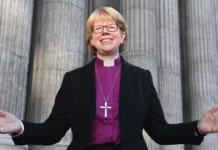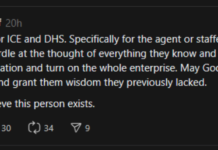ORTHODOX bishops at the Lambeth Conference – representing 75% of the Anglican Communion – announced today (29JUL) that they will be tabling their own ‘Lambeth Resolution (Call)’. They will invite fellow bishops, including the Archbishop of Canterbury, to re-affirm Lambeth Resolution 1.10 as the Anglican Communion’s ‘official teaching’ on marriage and sexuality.
The bishops also want the Communion to impose sanctions on Provinces which ordain bishops in same-sex relations, and conduct same sex weddings – something which has led to schism in the Church. They have also revealed that at the two Conference’ Eucharists at Canterbury Cathedral, orthodox bishops will not receive Holy Communion alongside gay-partnered bishops, and those who endorse same-sex unions in the Church’s faith and order. They shall remain seated.
Speaking at their opening Press Conference of the Lambeth Conference, leaders of the Global South Fellowship of Anglican Churches (GSFA) said they had taken the move after extensive requests to the Archbishop of Canterbury for a stand-alone resolution and, following the inserted reference to Lambeth 1.10 was withdrawn, on Tuesday, from the ‘Human Dignity ‘Call’. GSFA leaders claim that the Conference organisers have failed to recognise the foundations of ‘Lambeth 1.10’ which, they say, “is not just about sex and marriage, but fundamentally about the authority of the Bible which Anglicans believe to be central to faith and order”.
The GSFA will now table their Resolution and invite primates and their bishops to ‘sign up’. On Monday, senior GSFA representatives will seek to address the issue in the Plenary session on the Anglican Communion, making available the text of their resolution to all bishops, and providing secure means by which bishops can affirm their support. The GSFA is confident that leaders representing the majority of Anglicans across the globe will sign up. They will then present a signed copy by GSFA Primates, and others, to the Archbishop of Canterbury, inviting him to add his signature.
Lambeth 1.10 was formally passed at the Lambeth Conference in1998, at which the majority of bishops agreed that marriage is between one man and a woman for life, and that sexual abstinence outside marriage is the Bible’s clear teaching. The Resolution also committed bishops “to listen to the experience of homosexual persons, and we wish to assure them that they are loved by God and that all baptised, believing and faithful persons, regardless of sexual orientation, are full members of the Body of Christ.” It alsocalled on all churches to “minister pastorally and sensitively to all, irrespective of sexual orientation and to condemn irrational fear of homosexuals.”
Since then, provinces such as the Episcopal Church in America (TEC), the Episcopal Anglican Church of Brazil, the Anglican Church of Canada, the Anglican Church of Aotearoa, New Zealand and Polynesia, The Scottish Episcopal Church and The Church in Wales, have either ordained gay, married bishops, or opted to conduct gay weddings. This, despite the Resolution stating that the 1998 conference bishops “cannot advise the legitimising or blessing of same sex unions, nor ordaining those involved in same gendered unions”.
Following the election of a partnered gay bishop, Gene Robinson in the United States in 2003, and subsequent breaches of moratoriums requested in the Windsor Report of 2004, orthodox provinces in the Global South have been contending for the upholding of Lambeth 1.10 across the Communion. These orthodox provinces have adopted a Covenantal Structure among themselves that enhances ecclesial responsibility across member provinces.
Archbishop Justin Badi, Chairman of the GSFA and Archbishop of South Sudan said: “We have taken this action as if we are to ’walk together’ as a Communion, it must be on the based on a shared commitment to Holy Scripture.
“To us in our provinces, this is not primarily about gay sexual practices and unions, but rather that Anglicans look first and foremost to be guided in their faith and order by Scripture, and not by the passing cultural waves of Western society. Sadly, some provinces are adapting the teaching of the Church to try to appear relevant, and to make discipleship easier as a way of reversing fast-declining church attendance. But as disciples, we are not told in Scripture to mould Jesus into ‘our’ image, but to be continually transformed by the Spirit into ‘His’ image.
“For too long the Anglican Communion has been driven by the views of the West. We often feel that our voice is not listened to, or respected. We invite each primate and bishop to sign up to our resolution, and then with the majority of the Communion in favour, for the Instruments of the Anglican Communion to find ways to put faith and order back at the heart of what the Archbishop of Canterbury describes as ‘walking together’.
“Today in Canterbury, we may be ‘gathered together’, but we most certainly cannot ‘walk together’ until provinces which have gone against Scripture – and the will of the consensus of the bishops – repent and return to orthodoxy. The Communion is not in a healthy condition at present, and only major surgery will put that right.”
Archbishop James Wong, Archbishop of the Province of Indian Ocean added: “At this conference, we are being asked to look at the needs of our broken the world, and to offer hope. But we cannot mend a broken world when the Anglican Church is so broken and fractured. All provinces must remember that they are part of one body, and one Communion. Unfortunately, some provinces put emphasis on being autonomous, and forget the necessity of being interdependent.”
Commenting on the two joint services at the cathedral – which will now include the spouses of gay bishops – Archbishop Badi concluded: “GSFA primates will be discussing the services with their bishops, but all orthodox bishops will be encouraged to remain in their seats when others go to receive the bread and wine. This will be the start of a number of ‘visual differentials’ as we move forward from this conference.”
GSFA leaders are keen to stress that they have no intention of being a ‘breakaway group’ from the Anglican Communion. The Fellowship sees itself, and seeks to be part of, the ‘holy remnant’ that God has preserved in the Anglican Communion. The four-fold objectives of GSFA bishops attending Lambeth are: the unity of the orthodox, biblical faithfulness, non-separatist – but a holy remnant, and a commitment to world mission.




[…] From the point of view of Anglicans in the Global South, what is at the heart of this battle? The word “colonialism” is not being used, but it was certainly implied in this statement: […]
[…] From the point of view of Anglicans in the Global South, what is at the heart of this battle? The word “colonialism” is not being used, but it was certainly implied in this statement: […]